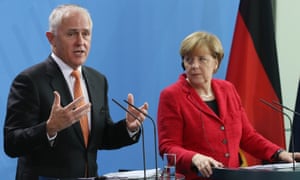Exclusive: The five-year Australian-German initiative to transition to new energy and low emissions was due to end in 2022
The Morrison government has told researchers at two of Australia’s leading universities it will break a commitment to fund an international collaboration into what is required to shift to a zero emissions future.
The Australian-German Energy Transition Hub was announced in 2017 by then prime minister Malcolm Turnbull and German chancellor Angela Merkel as a collaboration that would “help the technical, economic and social transition to new energy systems and a low emissions economy”.
Based at the University of Melbourne, the Australian National University and three German institutions, it was to receive $4m over five years from the Department of Foreign Affairs and Trade as part of an eventual full cross-country funding of $20m.
But in an email to staff on Friday afternoon, hub managers said the department had told them the government had decided it would “not follow through on its original commitment to fund the hub until 2022”.The Australian-German Energy Transition Hub was announced in 2017 by then prime minister Malcolm Turnbull and German chancellor Angela Merkel as a collaboration that would “help the technical, economic and social transition to new energy systems and a low emissions economy”.
Based at the University of Melbourne, the Australian National University and three German institutions, it was to receive $4m over five years from the Department of Foreign Affairs and Trade as part of an eventual full cross-country funding of $20m.
Government funding for the hub will end in June. Guardian Australia has been told there is $1.75m unpaid from the original agreement.
Some researchers said the decision made little sense given the hub’s work included areas of government interest, particularly the development of a clean hydrogen industry. Other hub projects focus on energy storage, energy system modelling, plans for a just transition to clean energy and integrating solar energy into the grid.
Dylan McConnell, from the University of Melbourne’s climate and energy college, said: “It’s seems pretty hypocritical and counter-intuitive to be talking about this [hydrogen] and at the same time cutting funding.”
The email said the department had indicated it hoped the hub would “continue to deliver” but it wanted to “refocus” resources “at a time of tight budgets”. It said negotiations between the University of Melbourne and the department were under way, and the university was “looking at the options for different levels of support”.
“Now, it is very early days to say what comes next,” the email, by hub managing director Rebecca Burdon and co-directors, Malte Meinshausen and Frank Jotzo, said.
“We know that our contribution is filling a key niche in the Australian and international research landscape, on a topic that is continuing to gain in importance. And we know that we have a great group of researchers (you!) working on crucial issues, and that we’ve established powerful networks.
“We also know that industry and most state governments, and many parts of the federal government, are keenly interested in the energy transition. And we know that the bilateral relationship between Australia and Germany is and remains important, including on energy. We will need to recalibrate our activities in order to maximise opportunities for alternative funding.”
The email said the department had noted in its reasoning that the German government had not continued funding for its side of the hub, which was for two and a half years. But it said the German institutes remained involved and were part of a separate upcoming major project funded by the government that was designed to advance the energy transition.
On Friday night, a department spokesperson said the goals of the hub were to strengthen Australia’s bilateral relationship with Germany and better coordinate investments in research in energy transition. They said the remaining funding would be reallocated “to support our strategic priorities with Germany and other European partners more effectively, including potential collaboration with Germany on hydrogen”.
Jotzo, Meinshausen and hub chairman Ross Garnaut declined to comment.
.png)

No comments:
Post a Comment